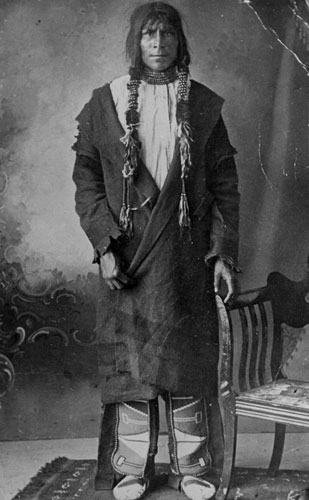
Early Life
Kitchi-manito-waya grew up on the One Arrow Reserve near Batoche, Saskatchewan. His grandfather, chief Kapeyakwaskonam ("One Arrow"), was a signatory to Treaty 6 at Fort Carlton in 1876. His father, Sinnookeesick ("Sounding Sky"), participated in the North-West Resistance of 1885.
Life on the reserve for Kitchi-manito-waya and his fellow Plains Cree was difficult (see Plains Indigenous Peoples in Canada); since their territory was controlled by the colonizers, practicing traditional ways of life, namely hunting, was limited (see Buffalo Hunt).
Arrest and Escape
On 22 October 1895, Kitchi-manito-waya was arrested for butchering a government steer and transferred to the jail at Duck Lake. While imprisoned, one of the arresting officers apparently told Kitchi-manito-waya in jest that the penalty for killing a government steer was hanging. Taking the joke seriously, Kitchi-manito-waya escaped from jail that night and fled to his reserve, about 32 km away.
Murders and Search Efforts
On 29 October 1895, North-West Mounted Police (NWMP) sergeant Colebrook tracked Kitchi-manito-waya down near Kinistino. During the attempted arrest, Kitchi-manito-waya shot and killed Colebrook. A $500 bounty was put on his capture on 20 April 1896.
There was some concern among police and Indian agents that Kitchi-manito-waya’s actions might encourage other Plains Cree to retaliate against colonial agents in an uprising. The pressure to find Kitchi-manito-waya was growing.
On 27 May 1897, Kitchi-manito-waya and two relatives — his brother-in-law and cousin — shot and wounded a local Métis scout near Duck Lake. The following day, NWMP inspector Allan cornered Kitchi-manito-waya in a poplar bluff in the Minichinas Hills, a few kilometres from his reserve. Shots rang out between the two, leaving Allan and a colleague seriously wounded. NWMP corporal C.H.S. Hockin, constable J.R. Kerr and Ernest Gundy, the Duck Lake postmaster, were all killed in an attack on the bluff that evening.
Death of Kitchi-manito-waya
On 30 May, a force of approximately 100 North-West Mounted Police (NWMP) officers and civilians tried to capture Kitchi-manito-waya and his allies. The bluff was bombarded with heavy gunfire, resulting in the deaths of Kitchi-manito-waya and his two companions.
This tragic confrontation with the NWMP highlights the tension between Indigenous peoples and federal and police agents on reserves during the 1890s.

 Share on Facebook
Share on Facebook Share on X
Share on X Share by Email
Share by Email Share on Google Classroom
Share on Google Classroom



